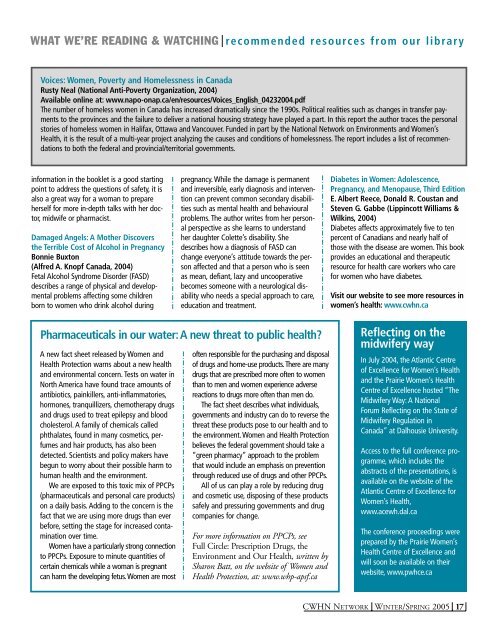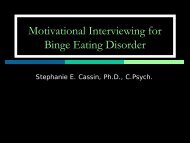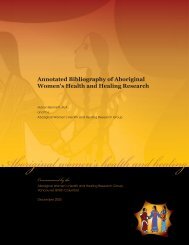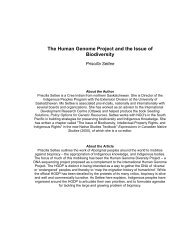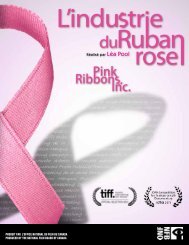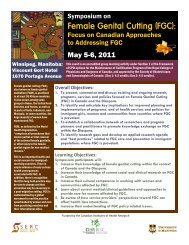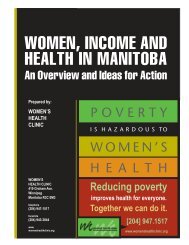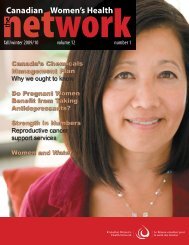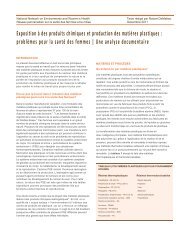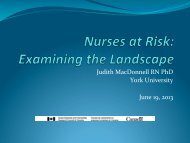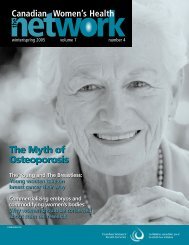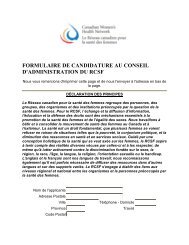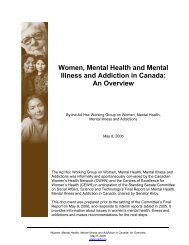NETWORK WIN00 - Canadian Women's Health Network
NETWORK WIN00 - Canadian Women's Health Network
NETWORK WIN00 - Canadian Women's Health Network
Create successful ePaper yourself
Turn your PDF publications into a flip-book with our unique Google optimized e-Paper software.
WHAT WE’RE READING & WATCHING recommended resources from our library<br />
Voices: Women, Poverty and Homelessness in Canada<br />
Rusty Neal (National Anti-Poverty Organization, 2004)<br />
Available online at: www.napo-onap.ca/en/resources/Voices_English_04232004.pdf<br />
The number of homeless women in Canada has increased dramatically since the 1990s. Political realities such as changes in transfer payments<br />
to the provinces and the failure to deliver a national housing strategy have played a part. In this report the author traces the personal<br />
stories of homeless women in Halifax, Ottawa and Vancouver. Funded in part by the National <strong>Network</strong> on Environments and Women’s<br />
<strong>Health</strong>, it is the result of a multi-year project analyzing the causes and conditions of homelessness. The report includes a list of recommendations<br />
to both the federal and provincial/territorial governments.<br />
information in the booklet is a good starting<br />
point to address the questions of safety, it is<br />
also a great way for a woman to prepare<br />
herself for more in-depth talks with her doctor,<br />
midwife or pharmacist.<br />
Damaged Angels: A Mother Discovers<br />
the Terrible Cost of Alcohol in Pregnancy<br />
Bonnie Buxton<br />
(Alfred A. Knopf Canada, 2004)<br />
Fetal Alcohol Syndrome Disorder (FASD)<br />
describes a range of physical and developmental<br />
problems affecting some children<br />
born to women who drink alcohol during<br />
pregnancy. While the damage is permanent<br />
and irreversible, early diagnosis and intervention<br />
can prevent common secondary disabilities<br />
such as mental health and behavioural<br />
problems. The author writes from her personal<br />
perspective as she learns to understand<br />
her daughter Colette’s disability. She<br />
describes how a diagnosis of FASD can<br />
change everyone’s attitude towards the person<br />
affected and that a person who is seen<br />
as mean, defiant, lazy and uncooperative<br />
becomes someone with a neurological disability<br />
who needs a special approach to care,<br />
education and treatment.<br />
Diabetes in Women: Adolescence,<br />
Pregnancy, and Menopause, Third Edition<br />
E. Albert Reece, Donald R. Coustan and<br />
Steven G. Gabbe (Lippincott Williams &<br />
Wilkins, 2004)<br />
Diabetes affects approximately five to ten<br />
percent of <strong>Canadian</strong>s and nearly half of<br />
those with the disease are women. This book<br />
provides an educational and therapeutic<br />
resource for health care workers who care<br />
for women who have diabetes.<br />
Visit our website to see more resources in<br />
women’s health: www.cwhn.ca<br />
Pharmaceuticals in our water: A new threat to public health?<br />
A new fact sheet released by Women and<br />
<strong>Health</strong> Protection warns about a new health<br />
and environmental concern. Tests on water in<br />
North America have found trace amounts of<br />
antibiotics, painkillers, anti-inflammatories,<br />
hormones, tranquillizers, chemotherapy drugs<br />
and drugs used to treat epilepsy and blood<br />
cholesterol. A family of chemicals called<br />
phthalates, found in many cosmetics, perfumes<br />
and hair products, has also been<br />
detected. Scientists and policy makers have<br />
begun to worry about their possible harm to<br />
human health and the environment.<br />
We are exposed to this toxic mix of PPCPs<br />
(pharmaceuticals and personal care products)<br />
on a daily basis. Adding to the concern is the<br />
fact that we are using more drugs than ever<br />
before, setting the stage for increased contamination<br />
over time.<br />
Women have a particularly strong connection<br />
to PPCPs. Exposure to minute quantities of<br />
certain chemicals while a woman is pregnant<br />
can harm the developing fetus.Women are most<br />
often responsible for the purchasing and disposal<br />
of drugs and home-use products.There are many<br />
drugs that are prescribed more often to women<br />
than to men and women experience adverse<br />
reactions to drugs more often than men do.<br />
The fact sheet describes what individuals,<br />
governments and industry can do to reverse the<br />
threat these products pose to our health and to<br />
the environment. Women and <strong>Health</strong> Protection<br />
believes the federal government should take a<br />
“green pharmacy” approach to the problem<br />
that would include an emphasis on prevention<br />
through reduced use of drugs and other PPCPs.<br />
All of us can play a role by reducing drug<br />
and cosmetic use, disposing of these products<br />
safely and pressuring governments and drug<br />
companies for change.<br />
For more information on PPCPs, see<br />
Full Circle: Prescription Drugs, the<br />
Environment and Our <strong>Health</strong>, written by<br />
Sharon Batt, on the website of Women and<br />
<strong>Health</strong> Protection, at: www.whp-apsf.ca<br />
Reflecting on the<br />
midwifery way<br />
In July 2004, the Atlantic Centre<br />
of Excellence for Women’s <strong>Health</strong><br />
and the Prairie Women’s <strong>Health</strong><br />
Centre of Excellence hosted “The<br />
Midwifery Way: A National<br />
Forum Reflecting on the State of<br />
Midwifery Regulation in<br />
Canada” at Dalhousie University.<br />
Access to the full conference programme,<br />
which includes the<br />
abstracts of the presentations, is<br />
available on the website of the<br />
Atlantic Centre of Excellence for<br />
Women’s <strong>Health</strong>,<br />
www.acewh.dal.ca<br />
The conference proceedings were<br />
prepared by the Prairie Women’s<br />
<strong>Health</strong> Centre of Excellence and<br />
will soon be available on their<br />
website, www.pwhce.ca<br />
CWHN <strong>NETWORK</strong> WINTER/SPRING 2005 17


